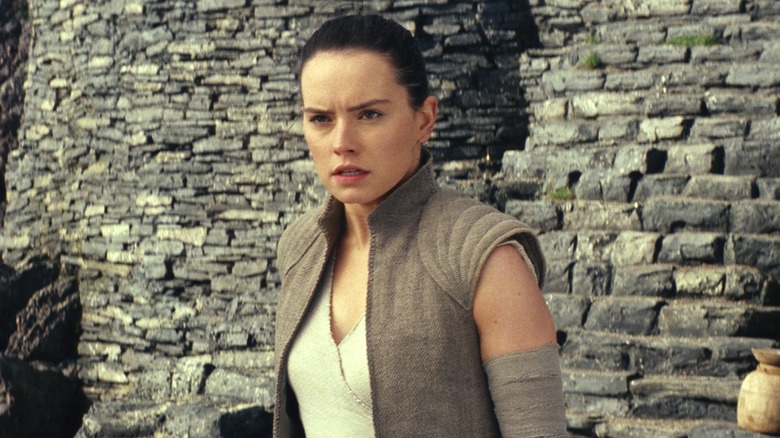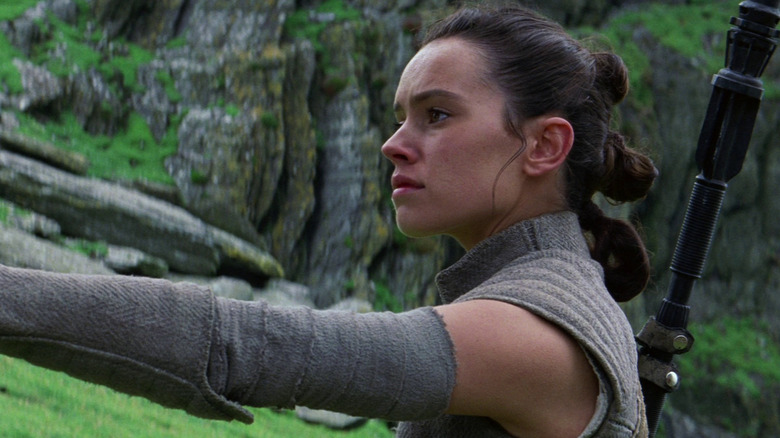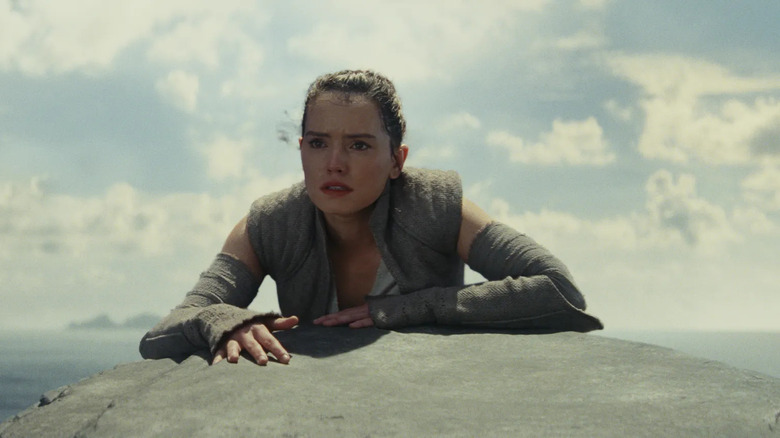Daisy Ridley Never Saw All Of The Star Wars Sequel Trilogy Hate
Although one might be able to consult a website like Rotten Tomatoes for a very general critical opinion of movies, it doesn't account for things like fan backlash, or that most nebulous of things: popular opinion. When looking over the "Star Wars" movies, most of them have been met with a great deal of critical approval. "Star Wars: The Force Awakens," for instance, currently holds a 93% approval rating on Rotten Tomatoes. The 2017 film "Star Wars: The Last Jedi" is holding steady at an impressive 91% approval rating. These scores, of course, don't necessarily speak to any kind of immutable truth about the "Star Wars" movies, but they do at least denote that the majority of critics were happy to give them a "pass."
Despite critics' opinions, however, a certain — very noisy — segment of "Star Wars" fandom hasn't been shy about speaking up about how much they loathe films like "The Force Awakens," "The Last Jedi," or "Star Wars: The Rise of Skywalker." In the realms of fandom, no film can be merely bad. It must be "the worst movie ever." And while such fan rancor may have always been an element of the pop culture landscape, the direct lines of communication between angry fan and besieged filmmaker was erased by the internet. One might recall how actress Kelly Marie Tran, who played Rose Tico in "The Last Jedi," was bullied off of social media because of how much certain creeps hated her character.
It should be noted that many of the complaints about recent "Star Wars" fare have come from extreme right-wing, sexist fringe-dwellers who go on platforms like 4Chan or The Federalist to make racist complaints.
"Star Wars" actress Daisy Ridley revealed in a recent interview how she weathered the firestorm.
Just don't look
Ridley played the role of Rey in three "Star Wars" sequels from 2015 to 2019. Her character was an orphaned junk dealer living in extreme poverty on a distant desert planet before she was whisked into a war between the evil First Order and the brave Resistance. While Rey fit the mold for a classical, archetypal hero character that "Star Wars" trades in, many essays began appearing accusing the character of being a Mary Sue. A Mary Sue, for those unfamiliar with the term, was coined in 1973 in "Star Trek" fanzines and refers to a fictional female character, usually seen in established media franchises, that may function as a "fan-insert" character. They often are lacking in human flaws and possess a great deal of power. Rey doesn't quite fit the definition, but the term was used nonetheless.
Ridley, in talking to Rolling Stone, wasn't aware of said accusations and had wisely gone on a social media fast while the "Star Wars" films were in production. It wasn't until complete strangers approached Ridley in public that she would understand that some people didn't quite like the new movies. She said:
"The funny thing is, because I don't read stuff and wasn't on social media for a while, when I was referring to how people can have big opinions about it, random people in the street would be so open with their opinions and I would be like, 'I'm good. I don't need to hear that. Cool. Great.' As a person, whether I liked a film or not, I would never go up to a person and go, 'I hated your film,' because I'm a human being. It was probably more gendered than I was aware of."
So much vitriol
The interviewer pointed out to Ridley that whenever she wrote about Rey, she would receive angry hate mail from angry misogynists and other cruel letter-writers. Indeed, a simple internet search can lead to any number of hateful articles about Rey and about the "Star Wars" sequels in general. Ridley had been around long enough to understand that the hatred would likely come rolling in regardless. What fun it must be to be a woman on the internet! She still hasn't read the articles or watched any of the YouTube videos, it seems. She said:
"Yeah. Luckily, I did not read anything. I think there's so much vitriol out there that I didn't need to read it. I felt for Moses Ingram recently and felt that in comparison it was so much worse for other people. I don't just think it's fandom. Everyone feels they need to say everything they're feeling, and I don't know that everyone does."
Moses Ingram played a character named Reva Savander on the recent Disney+ series "Obi-Wan Kenobi," and she was the subject of numerous racist attacks on social media and other platforms. Those in charge of "Star Wars" stepped in to defend her. This was after both Kelly Marie Tran and actor John Boyega found themselves targeted by abusers.
Fandom has long been a force for both good and evil in the world. On the one hand, fandom forms communities of outsiders where those with mutual interests can gather and befriend one another. On the other, it also fosters nitpicky attitudes about the importance of "canon" and keeping old properties sacred in juuuust the right way. Under the best of circumstances, such attitudes can encourage fun, non-serious debates. Under the worst ... well, Ridley was wise to stay offline.


